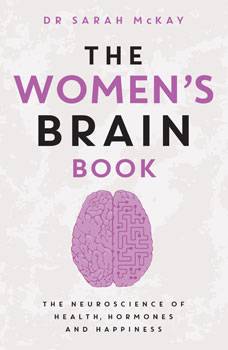The Women's Brain Book

Understanding how the brain grows and changes through the stages of life is key to health and wellbeing.
For women, understanding how the brain works during the key stages of life - in utero, childhood, puberty and adolescence, pregnancy and motherhood, menopause and old age - is essential to their health. Dr Sarah McKay is a neuroscientist who knows everything worth knowing about women's brains, and shares it in this fascinating, essential book.
Understanding how the brain grows and changes through the stages of life is key to health and wellbeing. This is not a book about the differences between male and female brains, nor a book using neuroscience to explain gender-specific behaviours, the 'battle of the sexes' or 'Mars-Venus' stereotypes. This is a book about what happens inside the brains and bodies of women as they move through the phases of life, and the unique - and often misunderstood - effects of female biology and hormones.
Dr McKay give insights into brain development during infancy, childhood and the teenage years (including the onset of puberty) and also takes a look at mental health as well as the ageing brain. The book weaves together findings from the research lab, case studies and interviews with neuroscientists and other researchers working in the disciplines of neuroendocrinology, brain development, brain health and ageing.
This comprehensive guide explores the brain during significant life stages, including:
In utero
Childhood
Puberty
The Menstrual Cycle
The Teenage Brain
Depression and Anxiety
Pregnancy and Motherhood
Menopause
The Ageing Brain
Dr Sarah McKay is an Oxford-educated, respected neuroscientist and the founder of the Neuroscience Academy. She specialises in translating brain science research into simple, actionable strategies for peak performance, creativity, health and wellbeing. She writes for numerous publications and has been published extensively for the professional audience.
The Women's Brain Book
Hachette Australia
Author: Dr Sarah McKay
ISBN: 9780733638527
RRP: $32.99
Interview with Dr Sarah McKay
Question: What inspired you to write The Women's Brain Book?
Dr Sarah McKay: A few years ago an editor asked me to write an article on brain health during menopause. I assume the answer would be simple, however, digging into the research and speaking to women's health experts, I learned that each woman's individual experience of menopausal brain-related symptoms depends on multiple interacting causes such as her general level of health and wellbeing, genetic makeup, previous experience of depression, how much sleep or exercise, she's getting, relationships and support networks, reproductive history and other life events.
My wander into the world of women's brain health got me thinking about so-called 'baby brain', a term rather like 'brain fog' that some of my friends use to describe pregnancy-induced fuzzy thinking and an inability to concentrate. What are the causes of 'baby brain', I wondered? Could we lay the blame solely on pregnancy hormones? Was it due to anxiety around giving birth? Or was a kicking baby merely a distraction?
My musings over brain changes during pregnancy and menopause and triggered a cascade of questions about womanhood, nature, nurture and neurobiology that I'd never before considered.
Was postnatal depression due to plummeting hormones after giving birth, lack of sleep, or loss of identity as a career woman? What about puberty blues? Was the emotional turmoil of adolescence due to the menstrual cycle? Or starting high school? What happens to our brains during the menstrual cycle? What impact does the pill have on our emotions? Is hormone replacement therapy (HRT) good or bad?
I realised I'd spent forty-odd years as the owner and operator of a woman's body and brain, and over half of those years working as a neuroscientist, but I'd given close to zero consideration to how my neurobiology was sculpted by my life as a girl and woman, and indeed how my female brain influenced my everyday life and experiences.
And so, the idea for this book was born. Selfishly, it gave me the opportunity to spend time finding the answers to questions I didn't know.
Question: Why is it so important for women (and men) to understand how the brain works during different life stages?
Dr Sarah McKay: One of the researchers I spoke to while writing the book, psychiatrist and women's mental health expert Sarah Romans, but it simply when she said, "Knowledge shapes women's own expectations about their health."
Time and time again during the book, I found research that overturned commonly held beliefs about women's brain and women's health.
Consider, for example the phenomenon of 'baby brain' or forgetfulness during pregnancy and early motherhood. The notion of 'baby brain' is not supported by studies of memory in pregnant women " our cognitive skills are equal to, and in some cases superior to before pregnancy. The same is seen in other species – pregnant females and mothers are smarter, quicker and braver than their non-pregnant sisters. One study found that what changed with pregnancy wasn't cognitive skills but 'the women's perception of themselves'
This is good news! Imagine if the neuroscience research supported the cultural myth of baby brain and was co-opted to discriminate against pregnant women and mothers in the workplace. Let's do ourselves a favour and rewrite the stories we tell ourselves.
Question: At what age does the brain change the most?
Dr Sarah McKay: The brain is capable of change at any age. To learn, remember and even read this words on this page requires changes in neural circuitry.
The book concludes with a story about Jeanne Calment the oldest ever woman who lived to 122, but who was tested for memory and mathematical ability at age 118. Over the six months of the testing program Calment's test scores improved. This reflected the ability of her brain to learn and change despite its advanced age.
That said, it is clear that babies', children's and teenager's brains possess the greatest capacity to change. In our youth the brain is at its most plastic. Brain architecture is refined during these periods of intense development.
Question: Who did you interview while researching and writing The Women's Brain Book?
Dr Sarah McKay: I'm not an expert in women's health or the female brain, so I'm grateful to the neuroscience and women's health researchers, doctors, academics, feminist scholars and psychologists from Australia, New Zealand, Canada, the US and UK who willingly and candidly gave of their time over coffee, lunch, phone and Skype (and at times nearly convinced me to consider research again). In addition to those I met, the research, books and articles of other scientists informed and inspired my work. I stand on the shoulders of giants.
Interview by Brooke Hunter
The Women's Brain Book
Hachette Australia
Author: Dr Sarah McKay
ISBN: 9780733638527
RRP: $32.99
MORE





